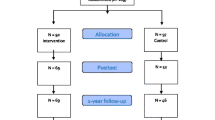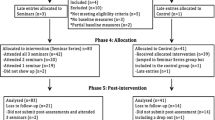Abstract
Brief Parent Training (BPT) is a short-term intervention (3–5 sessions) delivered by regular staff in municipal child and family services. BPT is based on social interaction learning theory and Parent Management Training, the Oregon model (PMTO) and promotes parenting skills in families with children who either are at an early stage of problem behavior development or have developed conduct problems. This study examined the effectiveness of BPT compared to regular services in primary care settings at post assessment. Participants were 216 children (3–12 years) and their parents who were randomly assigned to BPT or the comparison group. Data were collected from parents and teachers. Significant intervention effects emerged for caregiver assessments of parenting practices, child conduct problems, and social competence. The results suggested that BPT had beneficial effects for families, although the generalization of the effects to school was limited.

Similar content being viewed by others
References
Aarts, M. (2000). Marte Meo: Basic manual. Harderwijk: Aarts Productions.
Achenbach, T. M. (1991). Integrative guide for the 1991 CBCL/4-18, YSR and TRF profiles. Burlington: University of Vermont, Department of Psychiatry.
Askeland, E., Berg, E. T., Christiansen, T., Flock, M., & Launes, E. (2006). Handbook of brief parent training. Oslo: The Norwegian Center for Child Behavioral Development.
Baydar, N., Reid, M. J., & Webster-Stratton, C. (2003). The role of mental health factors and program engagement in the effectiveness of a preventive parenting program for Head Start mothers. Child Development, 74, 1433–1453.
Breitenstein, S. M., Gross, D., Garvey, C. A., Hill, C., Fogg, L., & Resnick, B. (2010). Implementation fidelity in community-based interventions. Research in Nursing and Health, 33, 164–173.
Brestan, E. V., & Eyberg, S. M. (1998). Effective psychosocial treatments of conduct-disordered children and adolescents: 29 years, 82 studies, and 5,272 kids. Journal of Clinical Child Psychology, 27, 180–189.
Chambless, D. L., & Hollon, S. D. (1998). Defining empirically supported therapies. Journal of Consulting and Clinical Psychology, 66, 7–18.
Cohen, J. (1992). A power primer. Psychological Bulletin, 112, 155–159.
Drugli, M. B., & Larsson, B. (2006). Children aged 4–8 years treated with parent training and child therapy because of conduct problems: Generalisation effects to day-care and school settings. European Child & Adolescent Psychiatry, 15, 392–399.
Eyberg, S. M., & Pincus, D. (1999). Child behavior inventory and Sutter-Eyberg student behavior inventory: Professional manual. Odessa, FL: Psychological Assessment Resources.
Flay, B. R., Biglan, A., Boruch, R. F., Castro, F. G., Gottfredson, D., Kellam, S., & Ji, P. (2005). Standards of evidence: Criteria for efficacy, effectiveness and dissemination. Prevention Science, 6, 151–175.
Forgatch, M. S. (1994). Parenting through change: A programmed intervention curriculum for groups of single mothers. Eugene: Oregon Social Learning Center.
Forgatch, M. S., Patterson, G. R., DeGarmo, D. S., & Beldavs, Z. G. (2009). Testing the Oregon delinquency model with 9-year follow-up of the Oregon Divorce Study. Development and Psychopathology, 21, 637–660.
Fossum, S., Morch, W. T., Handegard, B. H., Drugli, M. B., & Larsson, B. (2009). Parent training for young Norwegian children with ODD and CD problems: Predictors and mediators of treatment outcome. Scandinavian Journal of Psychology, 50, 173–181.
Glasgow, R. E., Vogt, T. M., & Boles, S. M. (1999). Evaluating the public health impact of health promotion interventions: The RE-AIM framework. American Journal of Public Health, 89, 1322–1327.
Glasgow, R. E., Lichtenstein, E., & Marcus, A. C. (2003). Why don’t we see more translation of health promotion research to practice? Rethinking the efficacy-to-effectiveness transition. American Journal of Public Health, 93, 1261–1267.
Kjøbli, J., & Ogden, T. (2009). Gender differences in intake characteristics and behavior change among children in families receiving parent management training. Children and Youth Services Review, 31, 823–830.
Kjøbli, J., & Sørlie, M. A. (2008). School outcomes of a community-wide intervention model aimed at preventing problem behavior. Scandinavian Journal of Psychology, 49, 365–375.
Larsson, B., Fossum, S., Clifford, G., Drugli, M. B., Handegard, B. H., & Morch, W. T. (2009). Treatment of oppositional defiant and conduct problems in young Norwegian children: Results of a randomized controlled trial. European Child & Adolescent Psychiatry, 18, 42–52.
Lavigne, J. V., Lebailly, S. A., Gouze, K. R., Cicchetti, C., Pochyly, J., Arend, R., & Binns, H. J. (2008). Treating oppositional defiant disorder in primary care: A comparison of three models. Journal of Pediatric Psychology, 33, 449–461.
Lundahl, B., Risser, H. J., & Lovejoy, M. C. (2006). A meta-analysis of parent training: Moderators and follow-up effects. Clinical Psychology Review, 26, 86–104.
Lurie, J. (2006). Teachers’ perceptions of emotional and behavioral problems in 6–12 year old Norwegian school children. Trondheim, Norway: Barnevernets Utviklingssenter i Midt-Norge.
Mathiesen, K. S., & Sanson, A. (2000). Dimensions of early childhood behavior problems: Stability and predictors of change from 18 to 30 months. Journal of Abnormal Child Psychology, 28, 15–31.
Merrell, K. W., & Caldarella, P. (2002). Home and community social behavior Scales: User’s guide. Eugene, OR: Assessment-Intervention Resources.
Moffitt, T. E. (2006). Life-course-persistent versus adolescence-limited antisocial behavior. In D. Cicchetti & D. J. Cohen (Eds.), Developmental psychopathology: Risk, disorder and adaptation (2nd ed., pp. 570–598). Hoboken, NJ: John Wiley & Sons.
Nøvik, T. S. (1999). Validity and use of the Child Behavior Checklist in Norwegian children and adolescents: An epidemiological and clinical study. Oslo: Centre for Child and Adolescent Psychiatry, Department of Psychiatry, University of Oslo.
Ogden, T., & Hagen, K. A. (2008). Treatment effectiveness of parent management training in Norway: A randomized controlled trial of children with conduct problems. Journal of Consulting and Clinical Psychology, 76, 607–621.
Patterson, G. R. (1982). A social learning approach: Coercive family process. Eugene, OR: Castalia Publishing Company.
Patterson, G. R., & Yoerger, K. (2002). A developmental model for early- and late-onset antisocial behavior. In J. B. Reid, G. R. Patterson, & J. Snyder (Eds.), Antisocial behavior in children and adolescents: A developmental analysis and model for intervention (pp. 147–172). Washington, DC: American Psychological Association.
Prinz, R. J., Sanders, M. R., Shapiro, C. J., Whitaker, D. J., & Lutzker, J. R. (2009). Population-based prevention of child maltreatment: The U.S. Triple P system population trial. Prevention Science, 10, 1–12.
Reedtz, C., Bertelsen, B., Lurie, J., Handegard, B. H., Clifford, G., & Morch, W. T. (2008). Eyberg Child Behavior Inventory (ECBI): Norwegian norms to identify conduct problems in children. Scandinavian Journal of Psychology, 49, 31–38.
Reid, M. J., Webster-Stratton, C., & Beauchaine, T. P. (2001). Parent training in head start: A comparison of program response among African American, Asian American, Caucasian, and Hispanic mothers. Prevention Science, 2, 209–227.
Schoenwald, S. K., Garland, A. F., Chapman, J. E., Frazier, S. L., Sheidow, A. J., Southam-Gerow, M. A. (2011). Toward the effective and efficient measurement of implementation fidelity. Administration and Policy in Mental Health and Mental Health Services Research, 38, 32–43.
Shaw, D. S., Dishion, T. J., Supplee, L., Gardner, F., & Arnds, K. (2006). Randomized trial of a family-centered approach to the prevention of early conduct problems: 2-year effects of the family check-up in early childhood. Journal of Consulting and Clinical Psychology, 74, 1–9.
Spoth, R. L., Kavanagh, K. A., & Dishion, T. J. (2002). Family-centered preventive intervention science: Toward benefits to larger populations of children, youth, and families. Prevention Science, 3, 145–152.
Statistics Norway. (2010). Inntekt etter skatt for par med barn og enslige forsørgere [Incomes for couples with children and single parents]. Retrieved from: http://statbank.ssb.no/statistikkbanken/Default_FR.asp?PXSid=0&nvl=true&PLanguage=0&tilside=selectvarval/define.asp&Tabellid=03703.
Storvoll, E. E. (1997). Children and youth with severe behavior problems: Who are they and which help are they offered? Oslo: NOVA.
Tabachnick, B. G., & Fidell, L. S. (2001). Using multivariate statistics (4th ed.). Needham Heights, MA: Allyn and Bacon.
Tambs, K., & Moum, T. (1993). How well can a few questionnaire items indicate anxiety and depression? Acta Psychiatrica Scandinavica, 87, 364–367.
Turner, K. M. T., & Sanders, M. R. (2006). Help when it’s needed first: A controlled evaluation of brief, preventive behavioral family intervention in a primary care setting. Behavior Therapy, 37, 131–142.
Webster-Stratton, C., & Hammond, M. (1998). Conduct problems and level of social competence in Head Start children: Prevalence, pervasiveness, and associated risk factors. Clinical Child and Family Psychology Review, 1, 101–124.
Weisz, J. R., & Gray, J. S. (2008). Evidence-based psychotherapy for children and adolescents: Data from the present and a model for the future. Child and Adolescent Mental Health, 13, 54–65.
Westen, D., Novotny, C. M., & Thompson-Brenner, H. (2004). The empirical status of empirically supported psychotherapies: Assumptions, findings, and reporting in controlled clinical trials. Psychological Bulletin, 130, 631–663.
Acknowledgement
We are grateful to the following people who participated in extensive work related to coordination of the study, data collection and data management: Trine Staer, Terje Christiansen, Roar Solholm and Bjørn Arild Kristiansen. Special thanks go to the families, agencies and interventionists for their contribution to this study.
Author information
Authors and Affiliations
Corresponding author
Rights and permissions
About this article
Cite this article
Kjøbli, J., Ogden, T. A Randomized Effectiveness Trial of Brief Parent Training in Primary Care Settings. Prev Sci 13, 616–626 (2012). https://doi.org/10.1007/s11121-012-0289-y
Published:
Issue Date:
DOI: https://doi.org/10.1007/s11121-012-0289-y




